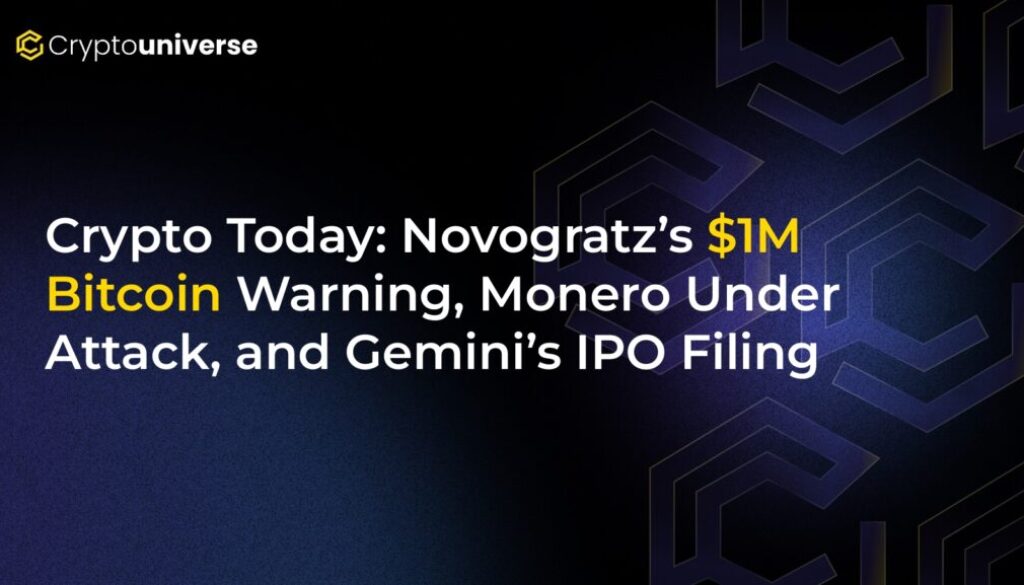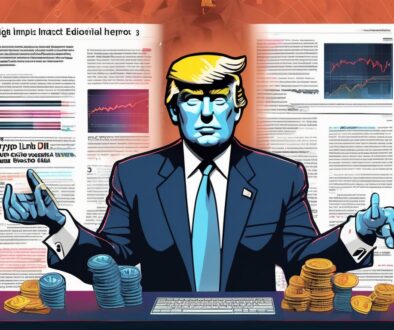Crypto Today: Novogratz’s $1M Bitcoin Warning, Monero Under Attack, and Gemini’s IPO Filing

A Turbulent Day in Crypto: Economic Warnings, Security Breaches, and Wall Street Ambitions
The cryptocurrency market never sleeps, and today was a testament to its volatile and multifaceted nature. While some leaders look to a future of astronomical prices, others warn of the potential economic turmoil that could trigger such a rally. Meanwhile, fundamental security challenges resurfaced for a major privacy coin, and a prominent exchange took a major step toward mainstream financial markets. Here’s a breakdown of the key events that shaped the crypto world today.
Mike Novogratz: A $1 Million Bitcoin Would Signal a Failing Economy
While many in the crypto community dream of a million-dollar Bitcoin, Galaxy Digital CEO Mike Novogratz offered a sobering perspective. Speaking on the Coin Stories podcast, Novogratz warned that such a price point by 2026 wouldn’t be a sign of crypto’s success, but rather a symptom of a deeply troubled U.S. economy.
“People who cheer for the million-dollar Bitcoin price next year, I was like, Guys, it only gets there if we’re in such a shitty place domestically,” he explained. Novogratz emphasized his preference for a more stable economic environment, even if it meant a lower Bitcoin price, stating, “I’d rather have a lower Bitcoin price in a more stable United States than the opposite.”
His comments highlight Bitcoin’s growing narrative as a “digital gold”—a safe-haven asset that investors turn to during times of severe currency devaluation and economic instability. When a national currency falters, assets with a finite supply like Bitcoin can become a critical tool for wealth preservation. Novogratz’s warning suggests that the path to a <$1 Million Bitcoin> might be paved with widespread economic hardship, a trade-off that many might not be willing to make.
Security Alert: Kraken Halts Monero (XMR) Deposits After 51% Attack
The Monero community was rocked by a significant security event today, prompting major exchange Kraken to take swift action. Kraken announced the temporary suspension of all Monero (XMR) deposits after the network suffered a 51% attack.
A 51% attack occurs when a single entity or group gains control of more than half of a blockchain’s total computing power (hashrate). This majority control gives them the ability to potentially prevent new transactions from confirming and even reverse completed transactions, undermining the integrity of the entire network.
In this case, an AI-focused layer-1 blockchain project named Qubic claimed responsibility, stating it had achieved dominance over the Monero network’s hashrate. The incident has ignited a fierce debate within the Monero community about network security, mining incentives, and the vulnerability of even established proof-of-work blockchains to such takeovers.
Winklevoss Twins’ Gemini Files for Nasdaq IPO Amidst Steepening Losses
In a major move toward mainstream adoption, Gemini Space Station, the crypto exchange founded by Cameron and Tyler Winklevoss, has officially filed to go public. The company submitted its filing with the U.S. Securities and Exchange Commission (SEC) to list its Class A common stock on the Nasdaq Global Select Market under the ticker symbol GEMI.
Founded in 2014, Gemini has grown into a multifaceted crypto powerhouse, offering a regulated exchange, custody services, the Gemini Dollar (GUSD) stablecoin, and a crypto rewards credit card. The IPO, which will be led by giants like Goldman Sachs and Morgan Stanley, marks the first time the company’s shares will be available to the public.
Key details from the filing reveal a dual-class share structure. The Winklevoss twins will retain all Class B shares, which carry ten votes per share compared to one vote for Class A shares. This ensures they maintain majority voting control, qualifying Gemini as a “controlled company” under Nasdaq rules. However, the filing also sheds light on the company’s financial challenges, revealing steepening losses ahead of its public debut, a reflection of the difficult market conditions facing crypto exchanges globally.


